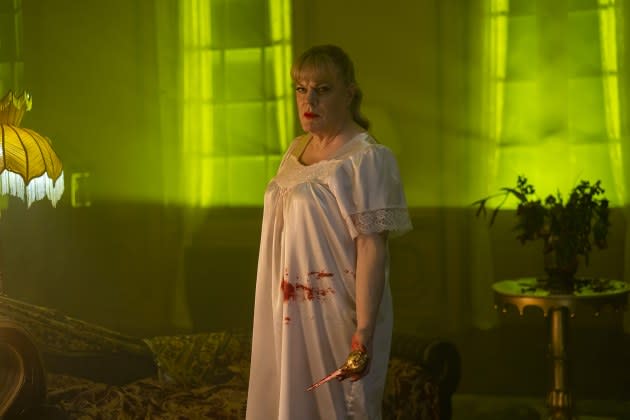‘Doctor Jekyll’ Review: A Multiple-Personality Mystery That’s Pulled in Too Many Directions
- Oops!Something went wrong.Please try again later.

“Always be two steps ahead,” repeatedly says Rachel Hyde, the famous alter ego of the namesake character in Hammer Studios’ “Doctor Jekyll.” The film’s director, Joe Stephenson, and his screenwriter Dan Kelly-Mulhern don’t take her advice, and it’s much to the detriment of their contemporary adaptation of the 1886 Robert Louis Stevenson novella, which can’t decide singularly what Jekyll’s transformation is a metaphor for. All volunteered options are either obvious or severely undercooked. Though Stephenson offers plenty of suitably spooky imagery, and importantly finds a more-than-game collaborator in Izzard as both the good and evil doctor, “Doctor Jekyll” is meandering and empty, an update with neither enough loyalty to its source material or imagination to make its departures meaningful.
The film stars Scott Chambers (an actor in Netflix’s “Malevolent,” and producer of the upcoming “Winnie-the-Pooh: Blood and Honey 2”) as Rob Stevenson, a just-released ex-convict whose brother Ewan (Morgan Watkins) secures him a job “providing care” for Dr. Nina Jekyll (Izzard), a pharmaceutical industry visionary convalescing in her gloomy, empty countryside mansion. Rob’s previous work as a caregiver mainly amounts to tending to older inmates while he was in prison, a skill set Nina’s estate manager Sandra Poole (Lindsey Duncan) appropriately identifies as inadequate for her billionaire client. But the young man inexplicably charms Nina, and she invites him against Sandra’s recommendations to live and work on her estate.
More from Variety
Leslie Jones, Eddie Izzard, Ramy Youssef and More Join Just for Laughs Montreal Lineup
Lindsay Duncan, Simon Callow Join 'Doctor Jekyll'; Principal Photography Wraps (EXCLUSIVE)
Eddie Izzard-Starring 'Doctor Jekyll' Boarded by Hammer Studios
Though his maintenance of her routines (eating, medications) is tenuous at best, Rob quickly becomes a confidante of Nina’s, especially after he discloses that he’s working primarily so that he can see his newborn daughter, Ari, who was born while he was in prison and is now in the hospital being treated for leukemia. But after overhearing a fierce argument between Nina and a person he believes is Sandra, Rob begins to develop suspicions that something mysterious, even violent is transpiring in the house — especially after the previously overbearing Sandra fails to return his calls.
Nina eventually discloses that she also sometimes becomes Rachel Hyde, a personality that’s the byproduct of pharmaceutical experimentation — and worse, is not just homicidal but determined to take control of her body permanently. But just as Nina asks him to help her rid herself of Rachel for good, Rob unexpectedly crosses paths with his ex-girlfriend Maeve (Robyn Cara), who is still an addict and threatens to blackmail him for access to their daughter unless he helps her get access to the hidden riches in Nina’s estate.
From 1,000 yards, “Doctor Jekyll” contains a lot of great ideas, starting with Izzard in the title role. By itself, her gender fluidity offers filmmakers telling Stevenson’s story a way to explore the complexities of identity, bodily autonomy and (in this updated context) the pharmaceutical industry’s efforts to facilitate — or impede — that kind of self-actualization. But even if it’s admirable that the filmmakers began their story establishing Nina’s gender as a nonissue, to do so feels like a missed opportunity. Izzard could play an erudite old queen in her sleep, but the fact that she doesn’t gives the film a charge as soon as she shows up as Nina and her mischievous counterpart. But the script’s equivocations about a diagnosis (the side effect of an experimental drug? a hereditary affliction? some form of demonic possession?) undercuts a lot of its narrative and dramatic weight.
It doesn’t help that Chambers proves ill-prepared in just about every way to play opposite Izzard. He’s got the screen presence of Shaggy from “Scooby Doo:” shambling and goofy, with no sense of how to navigate each scene, so he spends the first half of the movie grinning more like he’s happy he got the role than reacting to anything that Rob experiences. Not that he needs to portray a hardened ex-con, but there’s almost no sense that the character is a former drug addict and thief, details which are revealed way too late to impact his choices. That said, he seems exactly feckless enough to get bullied by his ex-girlfriend and manipulated by Nina. In her relatively brief but imposing role as Sandra, Duncan might as well be breaking the fourth wall each time she dresses down Rob for his incompetence.
Again, Stephenson effectively captures the remote, dust-covered mysteries of Nina’s estate, and when he’s not trying to amplify the film’s anemic suspense with turned-up-to-11 jump-scare sound effects, he creates a palpably unsettling mood. But for Hammer Studios, whose resurrection since 2007 has never managed to return the brand name to full steam, the film marks another stumbling block — an intellectual property cash-in that seems less interested in deconstructing the famous story upon which it’s based than in exploiting it. Because the filmmakers take the material with a modicum of seriousness, it fails even as camp, which could have redeemed it (especially in Izzard’s assured hands).
What, then, is Stephenson’s update meant to be about? Identity? Mental health? Bodily autonomy? Addiction? Corporate malfeasance? The id unleashed? One suspects if you showed this story to five people, they’d each give a different answer. It would be too on-the-nose to suggest that “Doctor Jekyll” suffers itself from multiple personality disorder, but certainly if there had been one or two stronger collaborators to take charge of the others on its creative team, it would have been a much better film.
Best of Variety
Sign up for Variety’s Newsletter. For the latest news, follow us on Facebook, Twitter, and Instagram.
